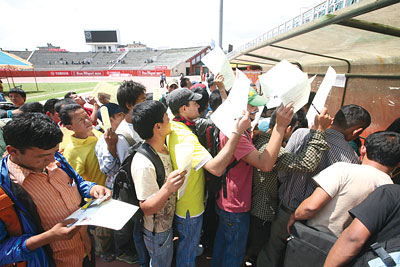 KIRAN PANDAY |
The serpentine queues to get application forms for the Korean Language Proficiency Test filled the front pages of Nepali newspapers this week. The first impression people get is the usual one. There is no future for Nepali youth, so they have to find ways to leave the country. Generations have done it before us, and generations more will do it after us. Bureaucrats, politicians, businesspeople, intellectuals, professionals � many tell their children not to come back to Nepal, as there is no future here.
But is it really the case that there are no opportunities for people in Nepal, especially at the worker level? Or is it that we are so fatalistic about Nepal we cannot see these opportunities? This Beed was chatting with some fellows busy flooring tiles the other day. The overseer was a migrant Indian worker who brings his own men over for the job. He told me there are about 7,000 people from his district in Midnapore, West Bengal, who are working just in tiles in Nepal. They send home around US$200 every month, which is more than the average remittance to Nepal.
It is estimated that about US$500 million leaves the country each year. This means for every dollar of remittance coming in, 25 cents goes out as reverse remittance, especially to India. Even for the country with the largest remittance inflow in the world (around US$22 billion), Nepal represents about 4-5% of income. Now consider that Nepali exports make up less than 0.1% of Indian imports!
Of late, the issue of domestic help has gained prominence in Kathmandu, with many complaining how difficult it is to find someone. While good domestic workers are earning around Rs 8,000 to Rs 10,000, we are yet to see a surge in people actually wanting to be employed as domestic help. Why is it that Nepalis don't want to work as hairdressers, washerwomen (or men), cleaners, door-to-door delivery people and lots of other service providers? Why should selling vegetables be considered a menial job? Nepalis would rather sweat in the Gulf's heat and be exposed to abuse than work for a Nepali in Nepal.
Are foreign masters really better than Nepali ones? Even in Nepal you get inklings of this mindset in the way you are served in restaurants frequented by expatriates and the way security guards and drivers with embassies or INGOs deal with their fellow-Nepalis. While 'dollar farmers' engaged in writing reports may link this to our feudal mindset, it is perhaps a little more complicated. Even in the development sector, Nepalis tend to perform differently under Nepali team leaders than they might under foreign team leaders. This holds true for the corporate sector, too.
So it seems the question of opportunity is more to do with the Nepali psyche than with Nepal's economy. What Nepali youths require is not only skills training (which is limited) but also a large-scale campaign that acknowledges that leaving Nepal is fine, but emphasises the fact that there is nothing wrong with working in Nepal if there are opportunities. This business of transformation, in itself, is a huge opportunity for those who see it.
READ ALSO:
Hollow state, Prashant Jha
Spectacle, not speculation, Rabi Thapa
Hollow state, Prashant Jha
FIFA fo fum, Ass



